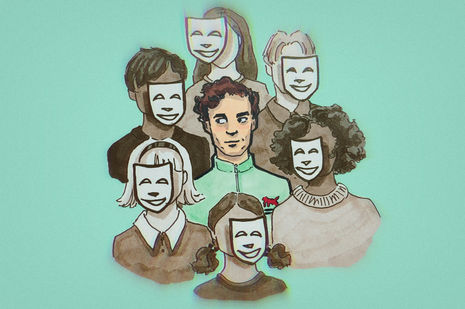Impostor syndrome isn’t a rite of passage
Katie Nicholson argues that the well-meaning assumption that all Cambridge students suffer from impostor syndrome does more harm than good

When I arrived at Cambridge after months of revision and hard work, I was ready to embrace what I had earned. But the moment I stepped into Freshers’ week, I was met with talk of imposter syndrome – something I hadn’t even considered until it was brought up. Okay, moving out of home and relocating across the country felt surreal, but it was what I had worked for. Why did I now believe that I should feel out of place?
From the start of Freshers’ week, it is drilled into us by supervisors and directors of studies that we deserve to be here, and that we have earned our places. This reassurance comes with an assumption: upon arriving, students will feel like they don’t belong or have snuck their way in. This implication can unintentionally undermine the affirming messages meant to support us. Everyone studying at Cambridge has worked to be here, having overcome different challenges. Feeling like you belong here should be admired, and the effort for admission respected. Not feeling like an imposter shouldn’t be seen as an abnormal thing.
“Accepting you deserve to be here isn’t a moral failing”
The suggestion that students are already questioning whether they deserve to be here further feeds this way of thinking. It makes it seem like the norm, allowing those who don’t share the feeling to be seen as self-righteous and overly self-assured. While imposter syndrome may keep students grounded, freshers should also be encouraged to celebrate their successes. Accepting that you haven’t been admitted by mistake is essential to a good university experience – no one needs the added pressure of feeling they have to constantly prove themselves.
Imposter syndrome is also often seen as something that can be eradicated after arrival, but for many arrival is where it begins. Results and hard work can create a feeling of acceptance, but academic assurance doesn’t ease the transition into the distinct social environment. That said, imposter syndrome isn’t a Cambridge-specific occurrence. Talking to people at other universities, it becomes clear that the reminder that you deserve your place is pushed to freshers up and down the country. Nonetheless, the academic and social environment at Cambridge exacerbate the feelings which contribute to imposter syndrome.
“Imposter syndrome is a barrier that can and should be removed”
In Cambridge, the constant competitiveness of league tables, or having your work critically compared to other people’s in a supervision means that the need to prove yourself and your academic work is never-ending. Obviously, academia is going to be a central part of university life, but the cutthroat culture means that, despite being constantly reminded that they do belong, students continuously have to prove it.
Alongside this, the social culture is exclusionary. Short terms and niche traditions mean that students can feel excluded from university life throughout their degree. I spent most of my first term trying to work out what a ‘college bop’ was (and finding a Cambridge University dictionary only opened my eyes to a plethora of terms I didn’t know). This is especially true for first-generation students or those with no immediate connection to Cambridge students who lack someone to prepare them for and to explain the inner workings of the university. The University does well to explain academic systems and support students with their studies, but socially this support is lacking.
Accepting you deserve to be here isn’t a moral failing. It doesn’t equate to being overconfident and cocky. Instead, accepting you’ve earned your place is integral to ensuring your university experience is enjoyable. Cambridge’s many quirks can be isolating, but if you’ve managed to navigate admissions and interviews, new terms and traditions should be a much smaller hurdle. Imposter syndrome isn’t a necessary feeling, and it should be stamped out, not cultivated, as the constant discussion of it does.
Although some may find comfort in naming their feelings, if more focus was put on decreasing academic pressure or making social elements more inclusive, the speeches and words of encouragement would be unnecessary. Instead, the constant discussion normalises and pushes imposter syndrome without addressing the causes or providing a way to overcome it. A shift from symbolic reassurances to meaningful action would be much more effective at fostering a sense of belonging. Rather than being a rite of passage, imposter syndrome is a barrier that can and should be removed.
 News / Colleges charge different rents for the same Castle Street accommodation2 March 2026
News / Colleges charge different rents for the same Castle Street accommodation2 March 2026 News / News in Brief: waterworks, wine woes, and workplace wins 1 March 2026
News / News in Brief: waterworks, wine woes, and workplace wins 1 March 2026 News / Climate activists protest for ‘ethical careers policy’1 March 2026
News / Climate activists protest for ‘ethical careers policy’1 March 2026 News / Angela Merkel among Cambridge honorary degree nominees27 February 2026
News / Angela Merkel among Cambridge honorary degree nominees27 February 2026 News / Private school teacher who lied about Cambridge degree barred from teaching27 February 2026
News / Private school teacher who lied about Cambridge degree barred from teaching27 February 2026









